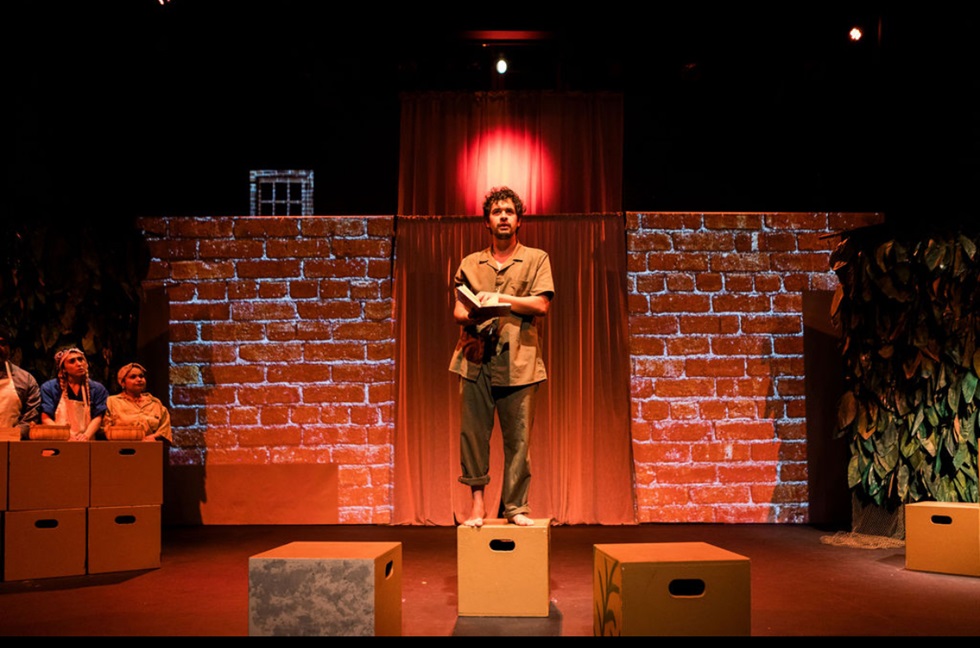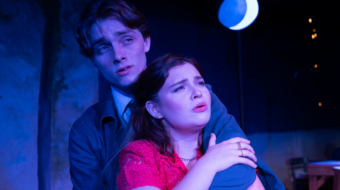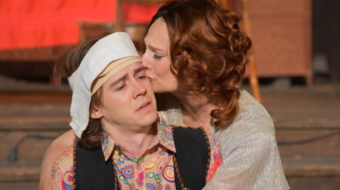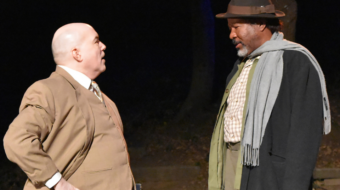
CULVER CITY, Calif. — Mariana Da Silva’s stirring one-act drama is set in the eponymous Ybor City, an actual neighborhood in Tampa, Fla., established by a cigar manufacturer in the 1880s. The play, which Da Silva wrote, directed and stars in, takes place during the Great Depression, when the demand for luxury cigars declined. Despite that fact, Nena (Da Silva) and Eddie (Luis Quintana), the adult children of a top Cuba cigar luminary, emigrate from their island to live and work in Ybor City. There Nena is supposed to look for a well-to-do white Yankee Doodle Dandy husband, and her brother becomes the manager of a struggling cigar factory. (This is The Actors’ Gang’s first bilingual play, with English and Spanish supertitles projected onto the theater’s walls and dialogue in both languages.)
Astute theatergoers will recall a similar setting for Nilo Cruz’s Anna in the Tropics.
Nena joins the Latino workforce of cigar rollers (Raiza Licea as Carla, Marcelina Valenzuela as Yari, Richard Loya as Toni) at the plant, experiencing the exploitation and safety hazards there as the owner Doc (Brent Hinkley) directs Eddie to enact exacting productivity measures in order for the factory to squeeze out a profit, at the expense of its proletarians. Another innovation Doc introduces is the full-time hire of a Reader (Jimmy Berry and Christian Skinner both play Readers) in the hope that their readings of various texts will take the workers’ minds off of their tedious labor, speed-up and general all-around oppression, thus making them more productive.

Ybor City explores persecution based on class, ethnicity, gender and immigration status. Eddie opposes any possible romance from developing between his younger sister Nena and Santos (Andres Velez), a poor fellow immigrant with aspirations to be a storyteller. But at the same time, as the wannabe arriviste Eddie strives to become a member of the gringos’ hoity-toity social club, he woos Meg (the daffy Megan Stogner), a young Caucasian woman who is sexually curious about Hispanic men. Alas, Meg’s snobby older sister Dora (Dora Kiss), frantically puts the kibosh on any liaison between Meg and Eddie, whom she deems unworthy of her white sister.
In the factory, the esoteric readings range from Cervantes’ Don Quixote to The Daily Worker, the Communist Party’s newspaper (forerunner of People’s World), and the Readers’ words rouse the cigar rollers to have impossible dreams of their own, leading to class struggle in the factory for better, safer working conditions and higher wages. (Some of the laborers sick of the sweatshop conditions they are forced to toil under already have communist leanings.)
The production has elements of proletarian theater and uses Brechtian techniques. Ybor City is also imaginatively staged in cinematic ways, incorporating projections of waves, the moon, musicians and more, plus a montage at the end that includes a picture of United Farm Workers co-founder Dolores Huerta (projections designed by Cihan Sahin). The lighting by Bosco Flanagan also has a filmic flair, especially with some shadowy imagery. As the conga playing La Cantante, musical director Maga Shukar injects a spiritual note that may allude to a magical realism that combines with the play’s social realism to create a unique sensibility.

Da Silva, who is Brazilian/Mexican, skillfully helms the cast, including directing herself as a woman who comes to awareness. After a disaster at the factory, Nena tires of being a mere passive listener and rises to the occasion, to become the first female Reader, and proceeds to tell her own stories. Just as auteur Mariana Da Silva has with this powerful play she has written, directed and starred in, she tells her moving story about resistance to injustice and exploitation. At a time of mass layoffs and mass deportations, although it’s set in 1932, Da Silva’s tale is uncannily timely and at the same time in the tradition of the Actors’ Gang rebellious spirit.
Ybor City is being performed at 8:00 p.m. on Thurs., Fri. and Sat. and at 2:00 p.m. on Sun., through April 5 at The Actors’ Gang Theater, 9070 Venice Blvd., Culver City, CA 90232. For info and tickets: (310) 838-4264, or go here. Fri. performances feature post-show talkbacks.
Ed Rampell’s novel about the Native Hawaiian Sovereignty Movement for Indigenous rights, The Disinherited: Blood Blalahs, will be published this Spring.
We hope you appreciated this article. At People’s World, we believe news and information should be free and accessible to all, but we need your help. Our journalism is free of corporate influence and paywalls because we are totally reader-supported. Only you, our readers and supporters, make this possible. If you enjoy reading People’s World and the stories we bring you, please support our work by donating or becoming a monthly sustainer today. Thank you!










